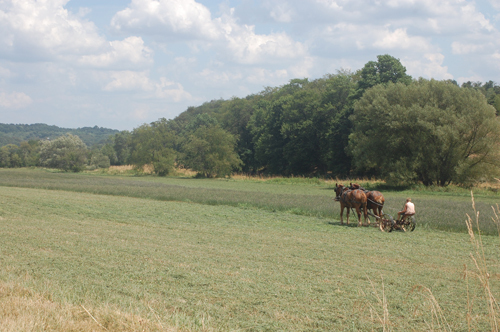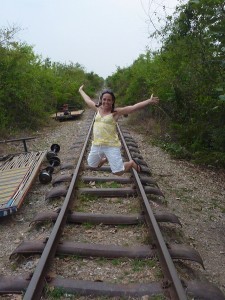Rolf Potts's Blog, page 29
August 31, 2014
Thomas Swick on the merits of traveling alone
Vagablogging :: Rolf Potts Vagabonding Blog
“Of course, writers of any kind are never the norm; those of us who write about travel are different from the start, since we usually head out alone. The reason cited most often is freedom from distraction; when you’re by yourself, you’re more attuned to your surroundings. Less discussed, but just as important, is the fact that, alone, you’re also more sensitive. You not only notice your surroundings more clearly, you respond to them more deeply. Smiles and small kindnesses mean more to the unattached traveler than they do to a happy couple. A merchant in Fethiye adds a few extra sweets to my purchase and I’m extremely touched, in part because no one has paid any attention to me in days. If I’d been there chatting with my wife, I wouldn’t have been so moved; I may not have even been aware. And the merchant quite possibly would not have been inspired like he was by my lonely presence.”
–Thomas Swick, A Moving Experience, The Morning News, 12/03/2013
Original article can be found here: Thomas Swick on the merits of traveling alone
August 30, 2014
Vagabonding Case Study: Michael Hodson
Vagablogging :: Rolf Potts Vagabonding Blog
Michael Hodson

goseewrite
Age: 46
Hometown: Fayetteville, Arkansas
Quote: Improve or go backwards, there is no standing still.
How did you find out about Vagabonding, and how did you find it useful before and during the trip?
I read Vagabonding before I took off on my RTW trip in late 2008. It was one of those books that was simply very inspirational. Back then, there weren’t too many people out there writing about long-term travel, so it was one of the sources of inspiration and education before I took off on my own journey.
How long were you on the road?
I left the USA in December of 2008 and haven’t gone back. Well, I go back every year to see my family for a few weeks, but I’ve been a permanent traveler and wanderer for over five years now. With no plans to stop in the near future.
Where did you go?
I set off in December of 2008 in an attempt to circle the globe without ever using an airplane. It took me sixteen months, six continents, and fifty-four countries (plus the southernmost and northernmost cities in the world), but I succeeded. It was the first of my “challenge travel” adventures, which are the things that excite me the most about travel still.
What was your job or source of travel funding for this journey?
I was a lawyer in the States for ten years before I left, so I funded those initial travels solely on the money I’d made doing that. Later on, as I kept traveling, I got a lot more serious about travel blogging to try to make money off that and now I do mostly video production for travel clients to keep going.
Did you work or volunteer on the road?
I didn’t on my initial RTW trip, which made it so much the better. I wish that I could get back to those days of travel purely for the sake of travel, but alas, the evil of the necessity of money keeps popping its ugly head up, if only to have money for good wine and food.
Of all the places you visited, which was your favorite?
Really tough question that I get all the time and I have so many ways to answer it. My favorite country in the world is New Zealand. I’d love to live there eventually, followed closely for that purpose by Italy. But most times when regular tourists or friends are asking, they want to know good countries to go visit for a couple weeks and I give them: Colombia, Namibia, Turkey, and Cambodia.
Was there a place that was your least favorite, or most disappointing, or most challenging?
I really can’t stand Russia or most Russians, frankly. They are horrible tourists and not much better in their home country. Aside from St. Petersburg, which is fabulously lovely (but far more European than the rest of Russia), pretty much the rest of the country is a place I’d not keen to go back to. As to the Russian tourists, I’ve seen signs in at least 5 dive shops from around the world on the wall saying “No Russians Allowed.” I’m in pretty much agreement with that sentiment.
Which travel gear proved most useful? Least useful?
Again, I’m a bit different than the normal traveler. I work on the road, so I have to have my laptop, my hard drives (8 of them right now), my cameras (5 of them), my drone, my microphones and the stuff I need to shoot and edit video and make a living. What non-work item is the most useful on my travels? No doubt my iPod. Because I do mostly overland travel, I spend a lot of time in transit and having music is a godsend.
What are the rewards of the vagabonding lifestyle?
Meeting new people and seeing new places. I’m not into travel for any huge life changing reason, and I find most of the people that preach “go travel and it will change you life” to be some of the most annoying people around. That being said, I’m always up for a new meal, a new sight, and a new friend. That’s pretty much the essence of it for me.
What are the challenges and sacrifices of the vagabonding lifestyle?
It is almost impossible to have a normal social life and it gets really old saying goodbye to people all the time. The less I think about both the better.
What lessons did you learn on the road?
Because of the way I generally travel, which is overland, the biggest thing I’ve learned is just how massive the planet is. If you fly from the US to Australia, it will take you 16 or so hours to make it. It took me 27 days on a cargo freighter in two separate journeys. The Pacific… it is big. The bonus to just how massive the planet is is that there are so many places to see. I get asked all the time when I’m going to stop traveling because “I must have seen it all.” Far, far from the case. I’m not even close to seeing 2% of the good stuff yet.
How did your personal definition of “vagabonding” develop over the course of the trip?
The essence of my RTW trip, aside from no airplanes, was also no reservations. Aside from the cargo freighter crossings which had to be booked weeks in advance, I never made a single reservation, for hotel or transport. And it was awesome. Too many people plan too much. Spontaneous travel is so much more fun.
If there was one thing you could have told yourself before the trip, what would it be?
Learn better ways to save up money and budget a bit better. I blew through a ton of cash on that trip. Wish I had some of it still around, so I could work less now.
Any advice or tips for someone hoping to embark on a similar adventure?
Don’t try to work and travel. It really lessens the experience. Save up as much as you can, then travel as long as you can on that.
When and where do you think you’ll take your next long-term journey?
I’m on it. And not stopping anytime soon. Ya’ll come join me and I’ll buy you a beer.
Read more about Michael on his blog, Go See Write , or follow him on Facebook and Twitter.
Website: Go See Write
Twitter: @GoSeeWrite
Are you a Vagabonding reader planning, in the middle of, or returning from a journey? Would you like your travel blog or website to be featured on Vagabonding Case Studies? If so, drop us a line at casestudies@vagabonding.net and tell us a little about yourself.
Original article can be found here: Vagabonding Case Study: Michael Hodson
August 29, 2014
Why We Buy Dumb Souvenirs
Vagablogging :: Rolf Potts Vagabonding Blog
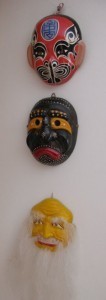 Here’s a curious trivia tidbit from U.S. history: In 1786, Thomas Jefferson and John Adams took leave from their Europe-based diplomatic duties and traveled to Stratford-upon-Avon to visit the home of William Shakespeare. Not much was recorded of the occasion, but one fact of their pilgrimage to the Bard’s birthplace stands out: At some point during the tour, the two American statesmen brandished pocketknives, carved a few slivers from a wooden chair alleged to have been Shakespeare’s, and spirited them home as souvenirs.
Here’s a curious trivia tidbit from U.S. history: In 1786, Thomas Jefferson and John Adams took leave from their Europe-based diplomatic duties and traveled to Stratford-upon-Avon to visit the home of William Shakespeare. Not much was recorded of the occasion, but one fact of their pilgrimage to the Bard’s birthplace stands out: At some point during the tour, the two American statesmen brandished pocketknives, carved a few slivers from a wooden chair alleged to have been Shakespeare’s, and spirited them home as souvenirs.
In retrospect, it’s easy to look back on this incident and conclude that — in terms of travel protocol, at least — Jefferson and Adams were complete knuckleheads. The thing is, I haven’t seen any evidence to prove that, as world-wandering travelers, our quest for souvenirs has become any more logical or dignified in the ensuing 220 years.
I mention this because I recently traveled to Key West, where a popular section of Duval Street is crowded with souvenir boutiques. In a certain sense, this stretch of Duval felt a tad anachronistic, since — in the age of eBay and similar online shopping venues — you don’t have to travel to a place like Key West to load up on painted seashells and exotic cigars. What struck me more, however, was not the items typically associated with Florida, but the bizarre overabundance of souvenir t-shirts, which said things like “Tell your boobs to stop staring at my eyes,” or “Farting is my way of saying I (heart) you.”
In one sense, it seems ridiculous that anyone would travel to Key West and buy a t-shirt that has nothing whatsoever to do with south Florida (“I’m not a bitch, I’m ‘Miss Bitch’ to you”). Still, bringing home a tacky keepsake from Key West can serve as a sort of travel credential — an existential referent that proves you went to south Florida and got drunk enough to exercise bad judgment. Similarly, for Jefferson and Adams, those Stratfordian wood-shavings were tangible proof that they had journeyed across England and touched a chair that had, presumably, once cradled Shakespeare’s butt.
Indeed, in most cases it would appear that souvenir hunting is not a meaningful examination of place so much as it is a litmus test of our own whims and preconceptions as travelers. In Egypt, for example, generations of tourists have obsessively sought relics that remind them of the Pharaonic landscape they’ve seen in books and movies. Hence, all the major Egyptian tourist sites do a steady trade in fake papyrus, Great Pyramid paperweights, and alabaster Nefertiti statues — none of which would be found in the home of any self-respecting Egyptian. Similarly, in Calcutta’s New Market, an unspoken caste system exists between Indian shoppers and souvenir-seeking tourists. The travelers instinctively gravitate into boutiques that sell carved elephant figurines and decorative jars of saffron, while the Indians shop for rubber bathmats, stainless steel pans, and digital calculators. The implication here, of course, is that buying an electric blender might be more representative of day-to-day Calcutta life than buying Kashmiri silk (though, admittedly, a blender would not look as good in your living room).
Although it may be tempting to blame this discrepancy on modern misconceptions, the tourist quest for souvenirs has always been somewhat skewed. In ancient Anatolia, locals hawked supposed Trojan War relics to credulous Greek travelers, and excavations in Italy have suggested that ancient Romans had a penchant for cheap glass vials painted with pictures of contemporary tourist attractions (none of these have been proven to be snow-globes, to my knowledge, but it’s easy to draw a parallel). In medieval times, Christian pilgrims wandering the Holy Land proved to be among the most gullible relic-hunters in human history, as they carted home enough crowns of thorns, Holy Grails, and apostle-femurs to stock a macabre, New Testament-themed WalMart.
If any world culture deserves mention for its souvenir idiosyncrasies, however, it is the Japanese, who have long considered the giving of gifts to be an essential social ritual. Since taking a leisured journey carries a cultural sense of shame at leaving one’s home duties, Japanese travelers reflexively seek out omiyage — small gifts that will be presented as an act of respect to the family members and coworkers they left behind. So common is this practice that some Japanese airports stock souvenirs from around the world in an effort to save travelers the hassle of finding them in their actual destinations. Hence, a given Japanese girl’s bedroom might feature a Mickey Mouse clock, a miniature Eiffel Tower, and a carved Balinese frog mask — each of which represent her father’s past trips to Florida, Paris, and Indonesia, and all which were purchased at Narita Airport.
In pointing out the global-historical foibles of souvenir-seekers, I don’t mean to position myself above the madness. Like so many tourists before me, I, too, have been known to display weakness in the face of Peruvian weavings, Latvian amber, and Korean lacquer-ware.
I’ve found, however, that bringing these items home and putting them on display has taught me an interesting lesson. Whenever I stroll into my office and gaze at my Mongolian masks and Syrian worry-beads, I find that they don’t evoke my Asian travel memories quite so effectively as the beat-up, navy-blue “Bruin Track & Field” t-shirt I wore in both countries.
Strange as this may seem, it makes perfect sense: When I bought the masks and the worry-beads, I was shopping — but when I wore the t-shirt I was hiking across the steppes beyond Ulan Bator, or exploring the mountaintop monasteries outside of Damascus.
Indeed, as novelist Anatole France once noted, I’d wager that “it is good to collect things, but it is better to go on walks.”
In Stratford-upon-Avon, at least, Thomas Jefferson and John Adams might have done well to heed this advice.
Tip sheet: Souvenir strategies that can reduce the knucklehead factor1) Don’t confine the notion of what a souvenir is.
Souvenir boutiques will be found in abundance in any major tourist area, but that doesn’t mean you must confine your souvenir-hunt to specialty shops. Any token of your trip — from restaurant placemats, to pressed leaves, to local candy — can serve as a personal keepsake. If seeking gifts for loved ones at home, check department stores and supermarkets before you hit the souvenir shop — odds are you’ll find something cheaper (and just as authentic) in these types of places.
2) Save souvenir shopping until the end of the journey.
Let a souvenir be a souvenir — a keepsake of experience — and don’t go off shopping for knickknacks before you’ve had some real travel adventures. Not only will this give you a social context for your destination before you start commemorating it with collectables, but it will also save you the hassle of dragging this newfound loot around with you as your journey progresses. An added bonus is that, as a shopper, you will have a better sense for the price and quality of your souvenirs once you’ve traveled and made some comparisons.
3) The experience is more important than the keepsake.
In the end, shopping anywhere is still just shopping. Don’t let the hunt for souvenirs get in the way of amazing travel experiences.
[This Rolf Potts article originally appeared in Yahoo! News on May 9, 2006. All rights reserved.]
Original article can be found here: Why We Buy Dumb Souvenirs
August 28, 2014
Vagabonding Case Study: Ligeia and Mindy
Vagablogging :: Rolf Potts Vagabonding Blog
Ligeia and Mindy

Age: 33 and 41
Hometown: Baltimore and Toronto respectively
Quote: I haven’t been everywhere, but it’s on my list.
How did you find out about Vagabonding, and how did you find it useful before and during the trip?
We only recently discovered Vagabonding through a Facebook group, so unfortunately we were not able to make use of it during our previous trips. We will, however, use this resource on our many upcoming trips.
How long were you on the road?
We have been living abroad for many years, including Europe and Southeast Asia, however, we were on the road for one month on the trip we’d like to highlight for this interview.
Where did you go?
We journeyed through China, Tibet and Nepal.
What was your job or source of travel funding for this journey?
We used our savings account to fund this adventure.
Did you work or volunteer on the road?
Not this time, but we very often do. We are currently working and volunteering, for example, for Save Elephant Foundation, which supports Elephant Nature Park in Chiang Mai, Thailand.
Of all the places you visited, which was your favorite?
We enjoyed so many places on this trip but our absolute favorite was our time in Tibet, more specifically Lhasa and Everest base camp. Lhasa was enticing for all the senses from people watching to the smell of incense and yak butter in the temples, from the crisp Himalayan air on our skin mixed with the hot sun to listening to the monks chanting and we could never forget the delicious taste of Tibetan momos.
Having visited in April, our overnight at Everest Base Camp was uncomfortably cold, even freezing the water in our water bottles solid. And yet, stumbling out of the tent with toothbrush in hand to see the rising sun hit the face of Everest made this one of our most memorable travel experiences.
Was there a place that was your least favorite, or most disappointing, or most challenging?
On this trip we were very disappointed by Kathmandu, mostly due to the party atmosphere in the Thamel district. We have since spoken with others who assured us that Kathmandu is not usually like that and that we happened to be there during Spring Break. So we are now eager to revisit and give the city another chance, as well as explore other parts of Nepal.
Which travel gear proved most useful? Least useful?
This trip was the first time that we took along an Android tablet and it turned out to be the most useful piece of gear that packed. It allowed us to enjoy movies on our 24-hour train journeys across China, gave us access to our email and we were able to compose blog posts on the road.
Everything we packed, we used during the trip, rendering everything useful.
What are the rewards of the vagabonding lifestyle?
Nothing is permanent and so if you are not happy with your surroundings or just need a new adventure there are no roots anchoring you to one place. In this way, Vagabounding gives you freedom to explore the world.
What are the challenges and sacrifices of the vagabonding lifestyle?
Nothing is permanent and this includes friendships, home and work. The transient lifestyle lends itself to constant change and therefore often takes the place of putting down roots. Maintaining strong relationships with your family and close friends becomes more challenging.
What lessons did you learn on the road?
We have learned so many lessons on the road, but in this interview we’d like to highlight three of them. The first and perhaps biggest lesson we learned on the road actually happened on the trip while we were in Tibet. Suffering through migraines, altitude sickness and nausea, Mt. Everest taught us that physical discomfort is only temporary and that wonderful memories will last a lifetime.
The second lesson was finding the perfect balance between honesty and safety regarding coming out as a lesbian couple. There have been times, such as in a homestay in the cloud forest in mountainous San Lucas, Guatemala, when we regretted not revealing our relationship when directly asked about it. We have therefore made the decision to always come out, except in places where we are concerned about physical safety.
The third lesson involves how to explain why we are vegan in different places around the world to make us truly understood (and not get meat in our meals). For example, we learned to describe our dietary choices to Central and South Americans from a health standpoint (aka, it will make us sick), to Southeast Asians on religious grounds and to North Americans and Europeans due to ethical reasons. Regardless of where we are in the world, all these reasons are true for us.
How did your personal definition of “vagabonding” develop over the course of the trip?
For us the term “vagabonding” has come to mean needing less to do more and having a hard time answering the question, “Where are you from?”
If there was one thing you could have told yourself before the trip, what would it be?
On the trip to China, it would have been nice to know ahead of time to expect mass numbers of people staring at us and wanting to take a picture with us. We eventually got used to this; however it was a bit annoying at first. Although we had heard about the widespread spitting on the street, trains and just about anywhere throughout the country, we still were not prepared for the stomach-churning sounds that went with it.
Any advice or tips for someone hoping to embark on a similar adventure?
We recommend going to Tibet sooner rather than later, because the culture there is quickly being swallowed up by China. When leaving Tibet, be prepared for Chinese exit immigration officials to look for and confiscate any literature related to Tibet, including a Lonely Planet guide or even a map. Across the whole region, be prepared for squat toilets, so get those leg muscles strong! When staying in hotels and guest houses, opt for shared bathrooms instead of private ones attached to your room, as we found they always smelled of mildew. Finally, from a Western point of view, the idea of personal space is nonexistent in a country with over a billion people. Watch a few hockey games so you know to effectively body check to ensure you get a seat on the bus, and don’t be surprised when you get a few elbows in your ribs.
When and where do you think you’ll take your next long-term journey?
We are planning on taking a trip to Myanmar and Vietnam in the next couple of months. Feel free to come along for the ride.
Read more about Ligeia and Mindy on their blog, Bounding Over Our Steps, or follow them on Facebook and Twitter.
Website: Bounding Over Our Steps
Twitter: @bounding_steps
Are you a Vagabonding reader planning, in the middle of, or returning from a journey? Would you like your travel blog or website to be featured on Vagabonding Case Studies? If so, drop us a line at casestudies@vagabonding.net and tell us a little about yourself.
Original article can be found here: Vagabonding Case Study: Ligeia and Mindy
August 27, 2014
The power of nostalgia for travel
Vagablogging :: Rolf Potts Vagabonding Blog
Travelers are curious. Why else would they put up with the more uncomfortable bits that make up “travel”? Squatting toilets for instance or anything that has anything to do with an airline.
Many of us are so curious that we want to see it all. The whole world. At the very least, a sample of each region from the world. That “see it all” curiosity is especially true for my husband. His initial thoughts on creating an itinerary are never “I’d like to go back to….” but always “We haven’t yet seen…”.
I, on the other hand, am a very nostalgic person. In some ways, that seems like a trait that wouldn’t encourage travel but would instead put a damper on curiosity for all things novel and strange.
Believe it or not, I think nostalgia can fuel travel too. Of course a person who has traveled as a kid may feel nostalgic about returning to the places they visited or simply about travel in general. But I think there are 3 ways in which nostalgia can inspire anyone to travel, even those who never traveled before.
1.) If you think about it, the discovery of something new is inherently familiar from our childhood. When is this world more full of discovery than when we’re children, constantly exploring “firsts”? Everything from our first bike ride to our first field trip comes with that feeling of discovering something novel. In that way, even a person who never traveled as a kid may feel nostalgic about new experiences and new places.
2.) Some people travel for the nostalgic feeling of a simpler time. One of my first jobs was as a front-desk clerk in a bed & breakfast in Amish Country Ohio and I must say, most of our tourists came to remember what life was like when the world was slower. Every day I heard someone exclaim, “My grandmother used to do it that way!” or “Yes, I remember when we made bread that way too.”
My point isn’t that nostalgia inspires you to travel to Amish Country but rather that nostalgia can inspire travel to developing or remote cultures, not yet saturated with all things digital. Eastern Europe for instance reminds me of the America my grandparents tell stories about. Yes there are cars driving down dirt roads in the countryside, but there are horse-drawn carts too. And pay phones! And little bakeries run by little old women in the same plain aprons my aunts used to wear when they made homemade bread.
3.) Doesn’t the study of genealogy and family history seem to sprout from nostalgia too? Genealogy seems to inspire even the least wander-lusting types to travel back to the place of their roots. There’s something fascinating, after all, about visiting a town you’ve heard family fables about. My grandmother used to sing a song about buying shoes in “Laderbach.” Never has she seen Laderbach, but seeing the name “Laderbach” on a sign in Switzerland brought back warm memories of my her singing the songs her grandma sang to her. It was fascinating to realize that a little hint of Switzerland had trickled down through the generations in the form of a song.
Nostalgia is a mysterious feeling in this way. It seems it’s not just a love of things familiar from our past, but sometimes a love of things reminiscent of a past we’ve never even seen ourselves.
Original article can be found here: The power of nostalgia for travel
August 26, 2014
Vagabonding Field Report: The Great Ocean Road
Vagablogging :: Rolf Potts Vagabonding Blog
The Great Ocean Road
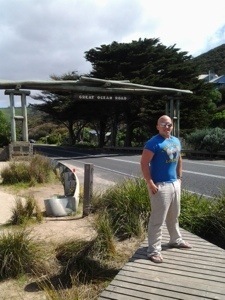
Cost/day
The Great Ocean Road and it’s scenic tourist hotspots come without cost. What we found was fuel was expensive and will eat in to much of your daily allowance. We estimated at least $150 was spent in 2 days. The particular campground we stayed on was around $35 bucks for a pitch. This would probably rise in peak season.
Describe a typical day
The great ocean road is nothing more than a spectacular scenic drive. A 250 kilometre road along the south coast of Australia. 250k is by no means a long drive in terms of driving across Australia which made it hard not to rush it.
We set out from Torquay a small town at the foot of the Ocean Road. Replenishing our food stock and refilling the petrol tank we set off. Putting pedal to metal we began our journey.
It is a hard task not to slow the driving down to a minimum as you peer out the window at the vast Ocean that separates Australia and the Antarctic. Within an hour we had pulled up at several viewing spots. Each spot offering a new perspective of this Vast coast. Our aim was to reach some of the more renowned landmarks but each twist and turn of the road would reveal a new outstanding view that just had to be savoured.
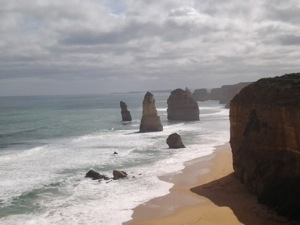
A few kilometres under our belt we pulled into to our first destination, a beautiful vantage point that looked out over the Twelve Apostles. These great natural monoliths stand tall and mighty from the ocean. The towering Rock formations are the result of years of erosion, proof of Australia’s natural beauty.
Although the rocks were once twelve standing spires only 8 remain. Remnants of the other four can still be seen led across the ocean below. A bare footed walk along the quiet beach allowed us time to stop and appreciate the pillars. An ample opportunity to take photos and dip your feet in the water.
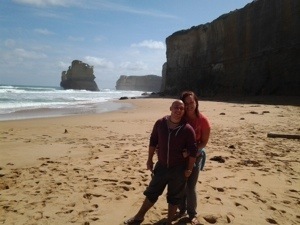
We took our time and enjoyed our surroundings before moving on. Hopping back into our camper we carried on down the road. We were in no rush and refused to cram too much into a single day. So we travelled further on and for one last point of interest, the London Bridge.
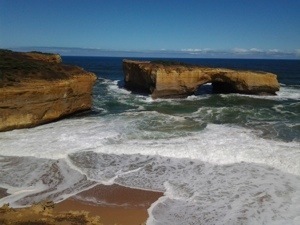
This scenic rock formation was no longer standing but is still a sight to behold. It was once a free standing arch created by years of erosion. It had collapsed and left behind a small island and remnants that lined the ocean floor. We listened to a local story teller tell a humorous tale of the rocks collapse With an hour taking in this picturesque sight we decided to make tracks.
In no particular hurry we stopped for a fish and chips at one of the many small towns along this drive. Relaxing by the water we researched a place to stay. A campsite 10 kilometres down the road and only a short drive to Airlies Inlet our first destination of our list for day 2.
Settling down we sparked up the barbecue, grilled ourselves some steaks and sat and enjoyed a glass of wine savouring the quiet relaxing surroundings. The stars filled the night sky as the sun fell away. The sound of the ocean gently soothed us as we reminisced on our amazing day.
Describe an interesting conversation
When we stopped at London Bridge a local story teller told the story of the day the rock collapsed. A man and a women had taken a stroll together across the rock to the island. After spending sometime here, the “bridge” had plummeted to the sea below. Both parties were fortunately safe but in need of rescue. With helicopters and sea rescue assisting the couple off the island it had stirred media interest. This was last thing the gentlemen had wanted. His intention was not to let anyone know where he had been that day. He had just so happened to become stranded on the island with his Mistress, an affair he would have rather kept under wraps. Instead he had made headline news and been exposed for all his infidelities. A true test of Karma.
What’s the strangest thing you’ve seen lately?
There isn’t really anything strange to see down this beautiful road.
What do you like about where you are? Dislike?
The best part of the journey for me was the scenery. It had been the picturesque dream I had imagined Australia to be. Enjoying the road with the windows down and the breathing in the cool sea air. The dream had become a reality
A minor dislike is the road is very short, we had hoped to travel for a few days, this is hard to do as campsites are few and far between. You will find yourself having to cover more distance in order to find a place for the night.
Where next?
Blue Mountains!!!!
Original article can be found here: Vagabonding Field Report: The Great Ocean Road
August 25, 2014
Are you afraid to travel?
Vagablogging :: Rolf Potts Vagabonding Blog
Aren’t you afraid?
In a word: No.
It’s a question people ask us in lots of quiet ways.
Aren’t you afraid of the political climates in less than first world places?
No, but we’re aware of them. Of course they colour our travels. We make choices to go some places, and not others, based on political climates, but that doesn’t mean we’re afraid of them. We’ve been in Mexico, Guatemala, Indonesia and Australia during various elections. It’s an educational time to be in a place, there are discussions taking place that don’t otherwise. We’ve stayed with members of politically subversive groups, we’ve attended political rallies in some countries to learn, we’ve intentionally spent time in dictatorships, and in Muslim countries, and in communist countries, as well as monarchies and countries in various stages of development specifically so that our kids will have a bit of perspective on the concept of democracy, but we are not afraid.
Aren’t you afraid of terrorists in “Muslim” places?
We are not. I’ve met thousands of Muslims, become friends with a very few, and lived in some of the most volatile Muslim regions of the world. We’ve been discriminated against, our website has been hacked and plastered with pictures of dead Palestinian children, our kid was once slapped hard for no reason that we could see. We’ve been watched by the secret police and our activity logged because of our nationality. It gives a person a bit of perspective on the American treatment of Muslims within the USA. It’s good for us, and for our kids, to get a grip on the beauty of Muslim culture, the open-handed generosity of the vast majority of the people who call themselves Muslim, and even the hard experiences have been good for us. There are folks who behave badly and occasionally blow stuff up within the Muslim world, but then, there are dudes who roll up into schools in Connecticut and military installments in DC and blow stuff up too. I’m not afraid to enter a school, or visit DC as a result; likewise, we are not afraid of Muslim terrorists.
Aren’t you afraid of the drug war “raging” around us in Central America?
The drug war of the American making, you mean? No. Families are not the targets of those behaving badly. Reasonable precautions are, well, reasonable. Take a quick look at the statistics, and you’ll quickly see that even with the “drug war” Mexico is a safer place than the USA. We’re not glibly blowing off the “danger;” we’ve had guys on a raid with locked and loaded AK-47‘s between us and our kids in northern Mexico. That’s a moment that gives a traveling parent pause, and makes a person happy to have reasonable Spanish in her aresenal. Honduras has it’s moments; we had one of our scariest travel moments there, but in the end, it was fine. Our community in Guatemala had a group of local men who took it upon themselves to patrol the road in and out of the valley after dark to keep a lid on the nefarious business. In every single case, even the scary ones, the reaction to our presence has been one of protection and care for our persons. We are not afraid. In fact, we are so “not afraid” that we let our daughter take off on her own with her friends when she was 14, and we are drawn back to that corner of the world as one of our homes.
Aren’t you afraid of not knowing where you’re going or where you’ll sleep tonight?
Nope. We’re just not. One thing you learn after traveling a while is that things just work out. We’ve never had to sleep under a bridge. We’ve never been so lost that we were unable to find “home” by nightfall. These things just work out. Keeping a sense of humor is the tricky part! 
Aren’t you afraid of being taken advantage of?
No, we aren’t, because we fully expect to be. Next issue.
Aren’t you afraid of having stuff stolen?
No, we aren’t because we know stuff will be stolen, at home or abroad, makes no difference. We had both mirrors very carefully stolen off of the van in New Orleans over Mardi Gras a few years ago. We had ipods lifted in Vietnam. It happens.
Aren’t you afraid of getting sick in some godforsaken place?
We have been, and we will be again. It’s not something we’re afraid of, it’s something we prepare for to the fullest extent possible. Including insurance, immunizations, a hefty first aid kit, and a habit of taking note of where the nearest hospitals are.
Aren’t you afraid of getting lost?
Nope. We made friends with the concept.
Aren’t you afraid of strangers?
Statistically, we should be afraid of the people we know. They’re the ones most likely to kidnap us or harm us in some way. Strangers have no reason to wish us harm, and consequentially are a safe and delightful bunch. “Stranger Danger” is a pernicious idea. I can’t imagine a worse thing to teach a kid than that the world is out to get him, when the exact opposite is the reality. Discretion is worth developing, the ability to “read” people is important to study and discuss with emerging adults, but to seed fear and distrust? How awful. Are we afraid of strangers? No, certainly not.
Aren’t you afraid of picking up hitchhikers?
We pick up loads of hitchhikers, the legit looking ones. I’ve never been afraid to pull over and pick up a traveling brother or sister, even when I’m alone. You can argue the hypothetical dangers until you are blue in the face and I will ask you one question: What is your PERSONAL experience? If you’ve never hitchhiked, or never picked up a hitchhiker, then frankly, I don’t think you get to weigh in. Statistically, there is less danger to picking up hitchers than there is driving your car to Walmart. Here are the facts from our personal experience: We’ve met dozens and dozens of fantastic people. We’ve made life long friends of a few. We had dinner with a real live knight because we picked up a hitchhiker. And here’s the icing on the cake: Are you ready?
This very day we are surfing east around Melbourne, Australia, on our way to spend a few days with dear family friends. How did we meet them? They picked up my mom and dad when they were hitching their way across North Africa forty years ago.
Now tell me again, how dangerous it is… and not in hypotheticals; back it up with personal experience or real data, then we’ll talk.
Aren’t you afraid of taking rides from strangers?
Nope. Not ever. We’re also not stupid about it, but we’ve never had a bad experience, nor do we know anyone who has (and we know hundreds and hundreds of pretty hard core travelers.)
Aren’t you afraid of running out of money and being stranded somewhere?
Ha! Always, and never. Money is a constant worry for everyone, isn’t it? This is one of those “7 P’s” moments, as my Uncle Dick would say: Proper Prior Planning Prevents Piss Poor Performance. We’ve run out of money (the 2008 market crash found us in Italy and swept away our entire trip savings) We had back up plans. We applied strategy to the situation. We’ve gotten stranded, but not for long. You figure it out, you know? Just like at home. I’m very glad not to find myself out of money and stranded somewhere in suburbia which is the antithesis of living my dreams. So yes, we’re afraid of running out of money and being stranded, just like you are, but we work through that, just like you do.
Here’s the thing about fear: You’re either paralyzed by it, or you’re actively overcoming it.
There are things to legitimately fear and there are precautions every traveler should be taking to minimize the risks. However, most of the fears that keep people from taking their dream trip are minor things, or things that can be planned for and risks reduced if not eliminated.
Read the full article, including why I’m not afraid of traveling with my children
Original article can be found here: Are you afraid to travel?
August 24, 2014
William Least Heat-Moon on why we travel
Vagablogging :: Rolf Potts Vagabonding Blog
“Why do we, for a spell, trade the security and comfort of a familiar place for the liberty offered by an unfamiliar space, a swap of domestic fixity for freedom of the open road? Even if we go as tourists, where there and then dominate the peregrination — rather than going like travelers, who each moment try to embrace the challenge of the here and now — don’t we usually set out motivated by curiosity of one degree or another? (A tourist, of course, may grow into a deeper traveler just as a journeyman sawyer becomes a master wheelwright; and further, all travelers, even the most awakened, are at times forced into mere tourism.) When we go on a visit (related to the word view), what may we hope to see (related to seek)? And what happens within us when seeing develops into seeking that encourages further seeing? Is such questioning not among the highest orders of human inquiry?”
–William Least Heat-Moon, Here, There, Elsewhere: Stories from the Road (2013)
(2013)
Original article can be found here: William Least Heat-Moon on why we travel
An interview with Freelance Writer Joe Henley
Vagablogging :: Rolf Potts Vagabonding Blog
As part of some tips for successful travel and freelance writing, I decided to interview Joe Henley. He is a Canadian freelance writer and death metal singer for Taiwanese band Revilement who has spent the past few years living in Taiwan, and will released his debut novel, “Sons of the Republic”, on American imprint Library Tales Publishing on September 12th 2014.
He’s an example of someone who set out to live in a foreign country and worked hard to realize the “writer’s dream”. I asked him a few questions to bring his experience as a useful example for other budding wannabe Vagabonding writers. read on… and as Joe says, keep writing.
How did you become a writer in Taiwan? Is being a white English native speaker an asset to break into a foreign country’s journalistic and media scene?
I started off working in academic publishing. I worked a somewhat dreadful desk job for years, actually, churning out articles and test materials for ESL publications. For that particular job, being a native English speaker was definitely part of what got me hired. There are labor laws here preventing companies from hiring anyone for jobs related to the ESL field who don’t come from certain countries wherein English is the official language. Then I started off getting freelance gigs on the side, and gradually built up my stable of regular jobs to the point where I was able to quit that job almost two years ago. It was fucking glorious.
 Is writing your main source of income, or is it still some sort of a part time job?
Is writing your main source of income, or is it still some sort of a part time job?
Now it’s my main source of income, though I do still supplement with other work. I’ve got a bit of a radio voice so I can get gigs doing voice overs for various things here and there. But mainly it’s writing and editing now.
Is travel writing a viable market in Taiwan, or do you have to write across different topics/platforms to make ends meet?
I think you definitely have to write across different topics and platforms to make a living. I do some travel writing for various publications, but it’s such a niche thing when you’re only dealing with one country, and a relatively small one at that. One of my regular jobs besides travel writing is covering the local music scene, but I also write about politics, sports, the arts—anything, really. You have to hustle to make ends meet, and that means being as diverse as possible.
You just published your debut novel, “Sons of the Republic“. How long did it take you to get it published? What can you suggest to other budding writers to ease this process?
Writing the book, all eighty-something-thousand words of it, only took a couple of months. I quit my job and that was the first thing I did. I had just turned 30 and had always talked about writing a book but had never actually done it. I feared becoming one of those insufferable assholes who always talks about being a writer but doesn’t actually accomplish anything, so I threw myself into it. The editing process took another few months, in between traveling to Canada, then going to Finland for a month on tour with my band, and also going to Indonesia, getting married there, and traveling for three weeks. That took me up to the summer of last year. After that, I sent it off to a few places and was either rejected or received no response at all. That led to the book sitting on a hard drive for a few months before I finally summoned the courage to try again. A few months back, I got the go ahead from Library Tales Publishing, so all in all, from start to finish, it was a journey of about a year and a half.
As for suggestions, I guess I would suggest that they not do what I did, which was get discouraged and do nothing with their work for several months. Keep shopping it around and see what happens. Maybe it will get published, and maybe some kindly editor out there will point out to you why it’s not getting published. You never know. Stranger things have happened.
What are the three most important things that you would suggest to newbie writers looking to get themselves started in the business?
1)It doesn’t matter how you get the words down. Just get the words down. I started out doing a music blog called Taipei Metal that I’m pretty sure was read by about three people, myself included. From an exposure standpoint it was probably awful, but in terms of practice it was irreplaceable. Later on, it did serve as a platform for getting me into paid music writing work, and that in turn led to other opportunities. Everyone starts at the bottom, and anything can serve as a springboard to bigger and better things so long as you’re willing to bust your ass.
2) Don’t expect the mythical meteoric rise. Be prepared to put in the time—a lot of it. It can take years to get established as a writer, especially if you’re trying to go the freelance route. I was 30 years old before I could safely make the jump into full-time freelancing. Others have been able to do it much sooner, but I don’t know any writers who had anything of significance in terms of their career happen overnight. Developing a voice takes time. Getting editors to trust the quality of your words takes time. So put in the time.
3) Listen to other writers. And don’t listen to other writers. In other words, choose your writers circle carefully. These days it seems like the goal is to connect with everyone. All that does is lead to overload. Overload of influence. Too many voices. Too much crap, in other words. The landscape is littered with those who represent themselves as writers to the outside world but are more in love with the image of being a writer than with the reality of it. The reality is hour upon hour of neglecting family, friends, and any semblance of a social life in favor of getting those “lucky words,” as Bukowski would call them, to dance on the page. If you can, seek out those in your particular community whom you can relate to, and who actually take the time to hone their craft. Avoid the ones propped up at the end of the bar boasting about the hours they’re putting into their next magnum opus like the plague—or cliches. And stay away from writing workshops. The bulk of them, anyway. Some are all right, I guess. But by and large they’re a breeding ground for people looking for a pat on the head. But what do I know? I’m awful at networking.
MARCO FERRARESE is a metalpunk guitarist who travelled extensively and lived in Italy, the United States, China, Australia and Malaysia. Since 2009 he’s been based in Southeast Asia as a writer, hardcore punk musician and researcher. He travelled from Mongolia to Australia in 2009, and hitchhiked from Singapore to Milano through Silk Road routes and the Middle East in 2012. He blogs at monkeyrockworld.com. Marco’s first Asian pulp novel Nazi Goreng was published in November 2013 on Monsoon Books. Follow him @monkeyrockworld
Original article can be found here: An interview with Freelance Writer Joe Henley
August 22, 2014
Just go!
Vagablogging :: Rolf Potts Vagabonding Blog
Why travel far and wide you ask
What will you perhaps find?
There’s so much here to see and do
Why go far to unwind?
So much to say – the words are hard
They make so much sense to me
Stay here to find the everyday
Or go abroad and see?
The fun, the peace and curiosity
It runs deep in my soul
Adventures to have and experiences I seek
The journey itself is the goal
In travel I find a piece of myself
I’ve yet to find at home
Truth and identity are ones that I seek
And I find it whenever I roam
It’ll never be easy or just the right time
To quit tradition or ditch the routine
Follow your dreams and go forth to find
So much learning from travel you’ll glean
Years from now what will matter more
What you did or didn’t do?
Remember you matter and you are important
And you choose what works for you
Venture out in the world there’s adventure afoot
The more you travel the more you know
Don’t wait for the right time for everyone else
If it’s right for you…JUST GO!
To read more of Stacey’s travel adventures, visit her website.
Original article can be found here: Just go!
Rolf Potts's Blog
- Rolf Potts's profile
- 323 followers


